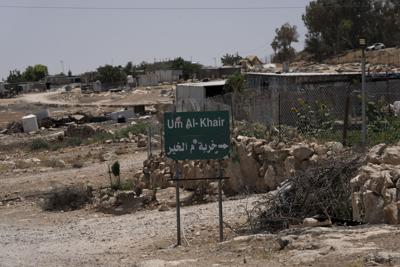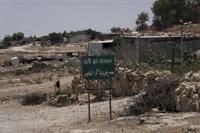TEL AVIV, Israel (AP) — A radical Israeli settler accused of shooting and killing a Palestinian activist during a confrontation with unarmed Palestinians in the occupied West Bank, and who was filmed firing a pistol during the incident, was released under house arrest on Tuesday.
Witnesses say Yinon Levi, who was previously under U.S. sanctions that were lifted by the Trump administration, killed Awdah Hathaleen, an activist, English teacher and father of three. The shooting occurred Monday night in Umm al-Khair, a village that has long weathered settler violence in an area profiled in an Oscar-winning film.
The Israeli military said an Israeli civilian had opened fire toward “terrorists” who hurled rocks at Israelis. Israeli police said they detained an Israeli for questioning “on suspicion of reckless conduct resulting in death and unlawful use of a firearm,” as well as five Palestinians and two foreigners.
Police said Tuesday that a court denied their request to extend the detention of the Israeli and ordered the suspect's release to house arrest. The police did not identify the suspect, but Israeli media ran photos of a smiling Levi inside a courthouse on Tuesday.
Multiple calls placed to Levi’s phone were not answered, and it was not known if he had hired an attorney.
Meanwhile, residents said four of the five arrested Palestinians remained in Israeli custody.
Umm al-Khair is in Masafer Yatta, the focal point of the Oscar-winning documentary “No Other Land,” which chronicles the Palestinians’ effort to remain on their land in the face of violence and the expansion of Jewish settlements considered illegal by most of the international community.
Hathaleen, whose footage appears in the documentary, was outspoken about life under Israeli occupation. His death sparked an outpouring of grief from family, international activists and rights groups.
“They took the other half of my heart,” his brother-in-law, Tariq Hathaleen, wrote on Instagram. “You were always telling the story, and now you’ve become the story.”
Video shows shots fired
The encounter in which witnesses said Hathaleen was shot was caught on video in footage obtained by The Associated Press.
The video shows Levi waving a pistol during a standoff with a group of Palestinians on a dusty road, a yellow excavator visible in the background. Witnesses said Levi was there to protect the excavator, which had rolled down from a nearby settlement and damaged Palestinian property earlier in the day.
Alaa Hathaleen, a cousin who filmed the encounter, said he approached Levi “face to face, filming him with my phone, telling him that we don’t have weapons and we were trying to stop him.”
In the video, a Palestinian shouts that Levi is a “bastard and a thief.” Levi shoves someone just out of the frame and shouts: “Who threw stones?”
Another Palestinian shouts “Shoot me! Shoot!” and Levi fires a shot, seemingly away from the crowd. He then glances back at the excavator and fires again. “Get away from here, go away!” Levi shouts.
The video does not show where the bullets struck.
Motasim Hathaleen, 38, another cousin who was standing a few dozen meters (yards) away, said he saw Levi fire twice and then saw Awdah fall to the ground. Local activists said they attempted CPR.
Trump had lifted US sanctions
Rights groups say Israeli security forces frequently ignore settler violence or intervene on the settlers’ side during confrontations with Palestinians. Israel says its forces try to maintain order.
The over 500,000 settlers in the West Bank have Israeli citizenship, while the territory’s 3 million Palestinians live under military rule, with the Palestinian Authority exercising limited autonomy in towns and cities.
Settler attacks on Palestinians have spiked since the outbreak of the Israel-Hamas war, as have attacks by Palestinian militants. The military has carried out several major military operations in the West Bank that have killed hundreds of Palestinians and forced tens of thousands from their homes.
Last year, the Biden administration imposed U.S. sanctions like travel bans and asset freezes on radical settlers accused of violence, including Levi. The State Department at the time accused Levi of leading settlers in attacks on Palestinians, threatening them, burning fields and destroying property. He is still sanctioned by the European Union, the United Kingdom and Canada.
Anti-settlement activists say Levi has led attacks that displaced more than 300 Palestinians from four nearby hamlets since establishing a settlement outpost known as Meitarim Farm in 2021.
In an interview last year, after the sanctions were imposed, Levi said the land was his and that he was protecting it from encroachment by Palestinians. He denied using violence to displace people.
“Little by little, you feel when you drive on the roads that everyone is closing in on you,” he said at the time. “They’re building everywhere, wherever they want. So you want to do something about it.”
U.S. President Donald Trump, who lent unprecedented support to Israel’s settlement movement during his first term, lifted the sanctions after returning to the White House.
‘What am I supposed to tell his kids?’
The extended Hathaleen family and activists gathered at a mourning tent on Tuesday. Israeli troops arrived later, ordering all foreign passport holders and media to leave, saying the area was a closed military zone.
“He left behind three children,” Alaa, who filmed the video of Levi shooting, said. “The oldest is only five years old. What am I supposed to tell his kids?”
Basel Adra, the Palestinian co-director of “No Other Land” who lives in a nearby village, said Awdah was a “father, was a teacher, was an amazing activist and a close friend to us.”
Umm Al-Khair was founded in the 1950s by traditionally nomadic Bedouin, who settled there after being uprooted from the Negev desert during the 1948 war surrounding Israel’s creation. Israel captured the West Bank in the 1967 Mideast war.
Last year, Israel’s military tore down a quarter of the homes in Umm Al-Khair, saying they had been built without Israeli authorization.
The settlement of Carmel, just a few miles away, was built in the 1980s. Large homes and lush gardens sit across a barbed-wire fence from the village, whose homes of corrugated tin bake in the summer sun.
On the day he died, Awdah sent an urgent call to his network of activists and reporters.
“The settlers are working behind our houses and the worst (is) that they tried to cut the main water pipe for the community," he wrote. “If you can reach people like the Congress, courts, whatever, please do everything. If they cut the pipe the community here will literally be without any drop of water.”
AP Senior Producer Jalal Bwaitel contributed to this report from Ramallah, West Bank.



